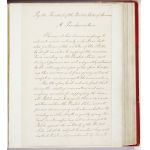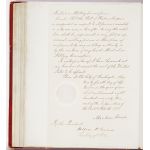President Lincoln's Proclamation Suspending the Writ of Habeas Corpus
9/24/1862
Add to Favorites:
Add all page(s) of this document to activity:

Add only page 1 to activity:
Add only page 2 to activity:
President Abraham Lincoln issued this Presidential Proclamation 94 suspending the writ of habeas corpus during the Civil War. The writ of habeas corpus is a tool preventing the government from unlawfully imprisoning individuals outside of the judicial process.
Transcript
[page 1]By the President of the United States of America,
A Proclamation.
Whereas, it has become necessary to call into service not only volunteers but also portions of
the militia of the States by draft in order to suppress the insurrection existing in the United
States, and disloyal persons are not adequately restrained by the ordinary process of law from
hindering this measure and from giving aid and comfort in various ways to the insurrection;
Now, therefore, be it ordered, first, that during the existing insurrection and as a necessary
measure for suppressing the same, all Rebels and Insurgents, their aiders and abettors within the
United States, and all persons discouraging volunteer enlistments, resisting militia drafts, or
guilty of any disloyal practice, affording aid and comfort to Rebels against the authority of the
United States, shall be subject to martial law and liable to trial and punishment by Courts
[page 2]
Martial or Military Commission:
Second. That the Writ of Habeas Corpus is suspended in respect to all persons arrested, or who
are now, or hereafter during the rebellion shall be imprisoned in any fort, camp, arsenal, military
prison, or other place of confinement by any military authority or by the sentence of any Court
Martial or Military Commission.
In witness whereof, I have hereunto set my hand, and caused the seal of the United States to be
affixed.
Done at the City of Washington this twenty fourth day of September, in the year of our Lord one
thousand eight hundred and sixty-two, and of the Independence of the United States the 87th .
[signed] Abraham Lincoln.
[signed] By the President:
William H Seward
Secretary of State.
This primary source comes from the General Records of the United States Government.
National Archives Identifier: 299959
Full Citation: Presidential Proclamation 94 of September 24, 1862, by President Abraham Lincoln suspending the writ of Habeas Corpus.; 9/24/1862; Presidential Proclamations, 1791 - 2016; General Records of the United States Government, Record Group 11; National Archives Building, Washington, DC. [Online Version, https://docsteach.org/documents/document/lincoln-habeas-corpus, April 18, 2024]Activities that use this document
- La Constitución en Acción
Created by the National Archives Education Team - Lincoln's Suspension of Habeas Corpus During the Civil War
Created by the National Archives Education Team - Separation of Powers or Shared Powers
Created by the National Archives Education Team - The Constitution at Work
Created by the National Archives Education Team
Rights: Public Domain, Free of Known Copyright Restrictions. Learn more on our privacy and legal page.





